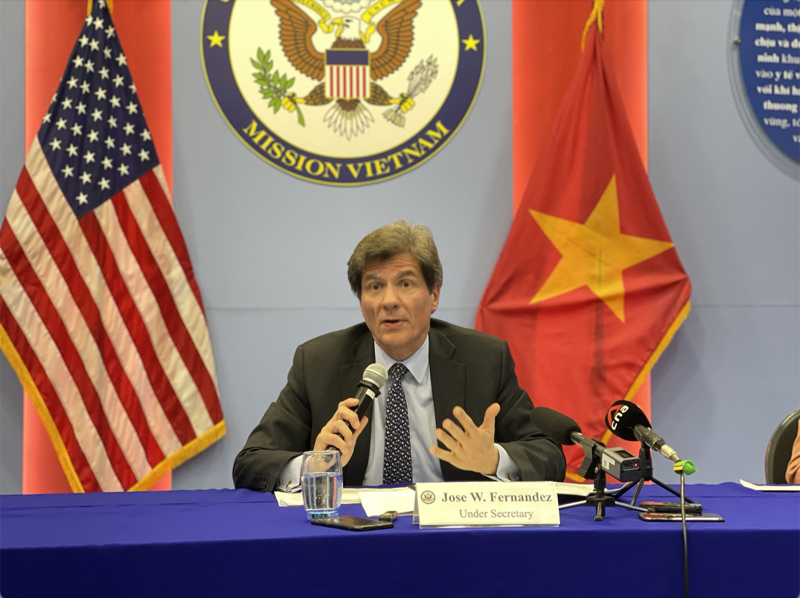US businesses have expressed a desire to only use renewable energy when investing in Vietnam’s semiconductor sector, Under Secretary of State for Economic Growth, Energy, and the Environment Jose W. Fernandez told a roundtable on January 26 in Hanoi as part of his visit to Asia from January 22 to February 1.
The country’s businesses are waiting for the renewable energy regime in Vietnam to expand, he went on, and are also waiting for permits to establish renewable power systems in Vietnam.
Though no specific names were revealed, the Under Secretary noted that, currently, there are 15 semiconductor companies who have said they are prepared to invest as much as $8 billion in Vietnam.
“Vietnam is one of the countries most vulnerable to climate change, so those investments will benefit it in two respects: expanding the semiconductor industry, and increasing the availability of clean energy in the country,” he said.
However, US businesses are struggling to find qualified human resources.
“A shortage of qualified workers and a proper regulatory framework for setting up renewable energy systems for use in semiconductor supply chains have been among the chief concerns of US companies wanting to invest in this industry in Vietnam,” he said. “The US Government cannot tell the companies what to do or where to go, but what we can do is work with the Vietnamese Government to improve the country’s business environment and its regulations on energy, to allow more companies to come to Vietnam to improve energy security. The US Government encourages businesses to invest in countries like Vietnam.”
He revealed that the US will work with Vietnam in supporting Vietnamese education institutions to educate over 50,000 engineers in the semiconductor field over the next few years, which is important for the development of the industry in the country.
In the next one or two months, he continued, there will be recommendations from the Organization for Economic Co-operation and Development (OECD) with regard to improving semiconductor human resources in Vietnam.
He also highlighted the 2022 “Creating Helpful Incentives to Produce Semiconductors and Science” Act (CHIPS Act), worth $280 billion, which provides not only for semiconductor manufacturing in the US but also provides for the US to support countries as they try to create an international semiconductor value chain.
Mr. Fernandez emphasized the need to diversify supply chains, adding that Vietnam has been one of seven countries around the world to have received funding from the International Technology Security and Innovation (ITSI) Fund established under the CHIPS Act.
He believes that Vietnam holds a lot of advantages, such as a young qualified workforce, a large domestic market of 100 million people, and an exporting culture, all of which align with the US in its goal of diversifying its supply chains.
On Vietnam’s side, according to the Under Secretary, it has also made efforts to express its desire to develop the semiconductor industry because it will bring benefits to the Vietnamese people and enhance the country’s position in global value chains.
He reaffirmed that the US is committed to supporting a strong, independent, resilient, and prosperous Vietnam. “Vietnam needs to seize the opportunity and understand the importance of this moment,” he said. “One fact is that there is competition all over the world. If Vietnam wins, it will be beneficial.”
Mr. Fernandez is on a tour to three Asian countries from January 22 to February 1, with Vietnam being the first leg, to be followed by the Philippines and South Korea.
His Vietnam visit is aimed at implementing agreements reached during President Joe Biden’s trip to Hanoi last September, he said.
He revealed that semiconductors are the focal point of the visit, and he has also discussed trade opportunities in minerals, cooperation in energy, and supply chains.
At a meeting with Prime Minister Pham Minh Chinh on January 25, the two discussed cooperation in semiconductor production and trade, workforce training, and clean energy, among other matters.









 Google translate
Google translate